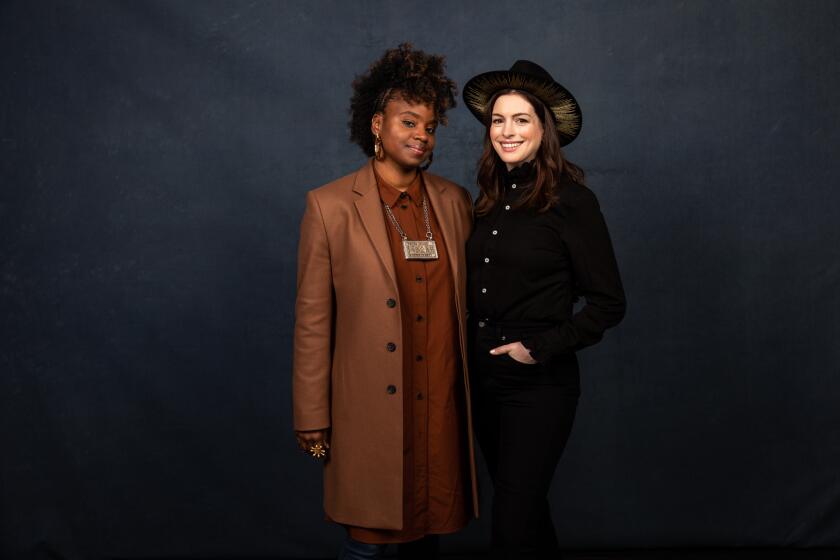Dee Rees and Anne Hathaway unpack the inevitable ending of ‘The Last Thing He Wanted’
Spoiler warning: This story discusses the ending of the Netflix drama “The Last Thing He Wanted.”
With her adaptation of Joan Didion’s novel “The Last Thing He Wanted,” Dee Rees has managed to make a deconstructed genre thriller that is both politically sensitive and emotionally acute, attuned to a wayward internal rhythm and a brittle, sharp performance by Anne Hathaway. A film exploring confusion and ambiguity with a devastatingly downbeat ending is bound to leave some people unsteady in their responses.
In the film, Hathaway plays a disillusioned journalist named Elena McMahon who is drawn into a gun-running scheme by her ailing father (Willem Dafoe) and finds herself on the run across Central America. She is torn between trusting either the American government official she knows to be of questionable ethics (played with smarmy grace by Ben Affleck) or the enigmatic operative named Jones (an elegantly commanding Edi Gathegi) who keeps popping up wherever she is.
Even before the start of the story, Elena has been through a lot, leaving behind her wealthy husband and life as a Hollywood wife, surviving breast cancer, setting herself up as a working, single mother and more. Yet for as willful and smart as Elena is, she is caught in a downward spiral of desperation, anger and despair, that ends — as it does in the novel — with her being shot and killed on a seaside cliff. What’s the cost of the political interventions, machinations and meddling that are ever-present in the the story? Her life.
Filmmaker Dee Rees and actress Anne Hathaway talk about the certainties of making ‘The Last Thing He Wanted,’ a story of ambiguity and confusion, adapted from the novel by Joan Didion.
“Of course it’s the thing that we’re still doing, like other countries where we’re still having a occupying presence,” said Rees of the film’s contemporary resonances. “It’s the same thing. Nothing’s new. Like bring America back again and make America great again. That’s nothing new. This country continues to behave in paternalistic, interfering ways.
“And I think in the ’80s was a time when maybe we didn’t quite understand what was happening and now we have the full view and that’s what I like about the book,” Rees said. “Because the book is told from the point of view of an unknown narrator. So we don’t even know who’s telling the story. And so when you step back and have the full view at the end, you understand how all these pieces were working in concert and how Elena was not in fact the byline, she became the subject. She became a tool in a way.”
During a joint interview with Rees at the 2020 Sundance Film Festival, Hathaway further described how the character steadily comes undone by recalling a time she herself was caught in a riptide, aware that there were some 20 paparazzi shooting her swimming and not wanting to wave for help or cause a scene. For a few terrifying moments, she was unsure of what to do or how to get out of the perilous situation she was in. (She finally found a foothold on a reef and steadied herself.)
“Bringing it back to Elena McMahon, I just think about all of these stories that we’re starting to tell as women,” said Hathaway, “and it’s so important to tell the success stories, but it’s also great to tell the stories of women who don’t make it, because there’s a lot more of them. It’s important for them to not be forgotten.
“And, make no mistake, part of the reason why Elena McMahon ends up the way she does is because of the world and the way that it treats its people,” said Hathaway, “and the way it decides who’s worthy of respect and who’s not. And that’s not something Elena is immune to by the way. She’s got her own blind spots.”
“I just want audiences to feel regret at the end and a sense of loss,” Rees said of the film’s ending. “And to think about what other stories have been buried. Elena becomes, like she says, she becomes history’s footnote. So what other footnotes don’t we know about? And so to feel regret for the many histories that have been erased from the main narrative.”
“The myth of the American cowboy, a lone moral voice with a gun, it’s a pretty toxic version of things,” said Hathaway. “And it’s a version of things a lot of people bought into and a lot of the stories that we’ve been told that starred that archetype ended before you saw the consequences.
“It’s really cool that Dee told a story about someone who, without realizing it, had absorbed that narrative and was acting out that narrative in her own way,” Hathaway continued. “But toxic narratives yield toxic consequences. So I don’t think that we could have ended any other way than it did. Otherwise we’d be giving the audience a chance to look away.”
“If she just goes home and hugs her daughter,” said Rees, “what is the drama in that?”
More to Read
Only good movies
Get the Indie Focus newsletter, Mark Olsen's weekly guide to the world of cinema.
You may occasionally receive promotional content from the Los Angeles Times.











